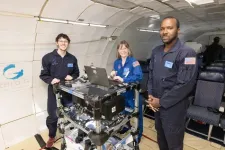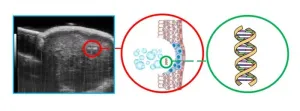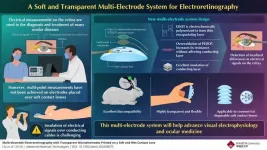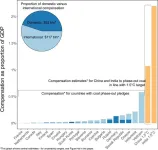(Press-News.org) An experimental treatment made from a plant virus is effective at protecting against a broad range of metastatic cancers in mice, shows a new study from the University of California San Diego.
The treatment, composed of nanoparticles fashioned from the cowpea mosaic virus—a virus that infects black-eyed pea plants—showed remarkable success in improving survival rates and suppressing the growth of metastatic tumors across various cancer models, including colon, ovarian, melanoma and breast cancer. Similar outcomes were also observed when the treatment was administered to mice whose tumors were surgically removed.
The findings were published recently in Advanced Science.
The new study builds upon previous research by the lab of Nicole Steinmetz, a professor of nanoengineering, director of the Center for Nano-ImmunoEngineering and co-director of the Center for Engineering in Cancer, all at UC San Diego. Steinmetz and colleagues have been using cowpea mosaic virus nanoparticles to trigger the immune system to fight cancer and prevent it from spreading and recurring. In early studies, the approach involved injecting the plant virus nanoparticles directly into tumors to stimulate an immune response. Even though the virus is non-infectious in mammals, the body’s immune cells still recognize it as foreign, triggering a robust immune reaction against the existing tumor, as well as any future tumors.
Now, Steinmetz and her team show that the plant virus nanoparticles do not need to be injected directly into tumors to be effective. Administering the nanoparticles systemically improved survival rates and inhibited metastasis across various cancer types.
“Here, we do not treat established tumors or metastatic disease—we prevent them from forming. We are providing a systemic treatment to wake up the body’s immune system to eliminate the disease before metastases even form and settle,” said Steinmetz.
To make the nanoparticles, the researchers grew black-eyed pea plants in the lab and infected them with cowpea mosaic virus. Millions of copies of the virus were grown and harvested in the form of ball-shaped nanoparticles, which required no further modification before use in experiments. “Nature’s powerful nanoparticles, as produced in black-eyed pea plants,” said Steinmetz.
The researchers tested the efficacy of the treatment in mouse models of colon, ovarian, melanoma and breast cancers. Mice injected with cowpea mosaic virus nanoparticles—and then challenged with metastatic tumors a week later—exhibited improved survival rates and reduced tumor growth compared to untreated mice. Even when challenged with new tumors a month later, treated mice exhibited similar outcomes.
The researchers are particularly excited about the treatment’s effectiveness post-surgery. In another set of experiments, administering the nanoparticles after surgical removal of tumors resulted in improved survival rates and decreased tumor regrowth in mice.
“Even if you perform surgery to remove the tumors, no surgery is perfect and there is outgrowth of metastasis if no additional treatment is provided,” said Steinmetz. “Here, we use our plant virus nanoparticles after surgery to boost the immune system to reject any residual disease and prevent circulating tumor cells from metastatic seeding. We found that it works really, really well!”
The goal is to gear up for clinical trials. As the research progresses, the team will be conducting safety studies and exploring the treatment’s efficacy in pet animals with cancer. Future studies will also focus on understanding the mechanisms underlying the immune-boosting properties of cowpea mosaic virus nanoparticles.
Paper: “Systemic Administration of Cowpea Mosaic Virus Demonstrates Broad Protection Against Metastatic Cancers.” Co-authors include Young Hun Chung, Zhongchao Zhao, Eunkyeong Jung, Anthony O. Omole, Hanyang Wang and Lucas Sutorus, all at UC San Diego.
This work was supported in part by the National Institutes of Health (R01-CA224605, R01-CA274640, R01-CA253615) and the Shaughnessy Family Fund for Nano-ImmunoEngineering at UC San Diego.
Disclosure: Nicole Steinmetz is a co-founder of, has equity in, and has a financial interest in Mosaic ImmunoEnginering Inc. Steinmetz is a co-founder of, and serves as manager of Pokometz Scientific LLC, under which she is a paid consultant to Mosaic ImmunoEngineering Inc., Flagship Labs 95 Inc., and Arana Biosciences Inc. The other authors declare no potential conflict of interest.
END
Plant virus treatment shows promise in fighting metastatic cancers in mice
2024-05-13
ELSE PRESS RELEASES FROM THIS DATE:
SwRI studies boiling processes in partial gravity aboard parabolic flights
2024-05-13
SAN ANTONIO — May 13, 2024 —Southwest Research Institute is studying the process of boiling liquids under partial gravity conditions in a series of parabolic flights. The internally funded project, conducted in collaboration with Texas A&M University, aims to better understand how liquids boil on different surfaces in partial gravity. Boiling liquids will likely be required during future extended space missions to the Moon or Mars to support surface power, life support systems, cryogenic fuel production and in situ resource utilization.
“We ...
Prostate cancer study: More health benefits from plant-based diet
2024-05-13
Men with prostate cancer could significantly reduce the chances of the disease worsening by eating more fruits, vegetables, nuts, and olive oil, according to new research by UC San Francisco.
A study of more than 2,000 men with localized prostate cancer found that eating a primarily plant-based diet was associated with a 47% lower risk that their cancer would progress, compared with those who consumed the most animal products.
This amounted to eating just one or two more servings per day of healthy foods, particularly vegetables, fruits, and whole grains, while eating fewer animal products, like dairy and meat. The study followed ...
When consumers would prefer a chatbot over a person
2024-05-13
COLUMBUS, Ohio – Actually, sometimes consumers don’t want to talk to a real person when they’re shopping online, a new study suggests.
In fact, what they really want is a chatbot that makes it clear that it is not human at all.
In a new study, researchers at The Ohio State University found that people preferred interacting with chatbots when they felt embarrassed about what they were buying online – items like antidiarrheal medicine or, for some people, skin care products.
“In general, research shows people would rather interact with a human customer ...
Intense ultrasound extracts genetic info for less invasive cancer biopsies #ASA186
2024-05-13
OTTAWA, Ontario, May 13, 2024 – Ultrasound imaging offers a valuable and noninvasive way to find and monitor cancerous tumors. However, much of the most crucial information about a cancer, such as specific cell types and mutations, cannot be learned from imaging and requires invasive and damaging biopsies. One research group developed a way to employ ultrasound to extract this genetic information in a gentler way.
At the University of Alberta, a team led by Roger Zemp explored how intense ultrasound can release biological indicators of disease, or biomarkers, from cells. These biomarkers, ...
Weight loss drug linked with reduced need for diuretics in heart failure patients
2024-05-13
Lisbon, Portugal – 13 May 2024: Semaglutide reduces the need for loop diuretic use and dose, and has positive effects on symptoms, physical limitations, and body weight in patients with heart failure with preserved ejection fraction (HFpEF) regardless of diuretic use, according to late breaking research presented today at Heart Failure 2024, a scientific congress of the European Society of Cardiology (ESC).1
HFpEF is a condition in which the heart pumps normally but is too stiff to fill properly, rendering the heart unable to support the body’s need for oxygen-rich blood. The condition is becoming more common as populations ...
Getting out of the political echo chamber
2024-05-13
Civilized political debates may seem increasingly out of reach as democracies across the world face rising polarization, but people still want to discuss issues with people they disagree with – especially those who present themselves as balanced and willing to seek solutions that work for everyone or open to learning new information, according to two studies published by the American Psychological Association.
One study, published in the Journal of Experimental Psychology: General, examined how U.S. politicians and ordinary Americans with opposing political beliefs could share their ideas on divisive issues in a way that improved respect regardless of political ...
Alarming rise of electronic vaping use in U.S. adolescents
2024-05-13
Electronic vapor products (EVPs), also known as e-cigarettes or vaping devices, have an allure because of their marketed image as a safer alternative to traditional cigarette smoking and for their variety of appealing flavors.
Yet, they contain many substances beyond nicotine, including propylene glycol, glycerin, flavorings and potentially harmful chemicals such as formaldehyde and metals, which could pose significant health risks such as respiratory disease, cardiovascular disease and cancer. Vaping also is strongly linked with a serious medical condition that damages the lungs due to the vitamin E acetate, an additive used ...
More than half of Americans give to charity at checkout, survey shows
2024-05-13
BINGHAMTON, N.Y. -- 53% of Americans give impulsively to charities at the checkout, and certain demographics tend to give more, according to a new survey conducted by faculty at Binghamton University, State University of New York.
From supermarkets to retail, Americans are used to being asked for donations while making in-person or online purchases – whether by rounding up, donating a set amount or purchasing a token. Industry reports reveal how money is being raised – checkout charity campaigns brought in almost $750 million in 2022, with campaigns through ...
Taking electroretinography to the next level with a soft multi-electrode system
2024-05-13
Eye diseases are becoming more prevalent worldwide, partly because of the aging population, but also because of our greatly increased screen time compared to previous generations. Considering our use of displays will most likely keep rising due to technologies such as virtual and augmented reality, we must improve our diagnostic techniques for the early detection and monitoring of ocular diseases.
Among the arsenal of tools ophthalmologist have at their disposal, electroretinography (ERG) still holds much-untapped potential. Simply put, ERG consists of taking measurements of the electrical ...
New Study: The price tag of phasing-out coal
2024-05-13
Coal phase-out is necessary to solve climate change, but can have negative impacts on workers and local communities dependent on coal for their livelihoods. Researchers at Chalmers University of Technology in Sweden and Central European University in Austria have studied government plans for coal phase-out around the world and discovered that more than half of such plans include monetary compensation to affected parties. This planned compensation globally amounts to USD 200 billion, but it excludes ...





